At TagPoint, we have noticed that Facility Management and Property Management are easily misunderstood by our clients. And it's quite understandable. Considering the number of options available in both fields, it can be challenging to differentiate between them.
The purpose of this article is to help you understand the vast topic of Facility and Property Management — including how the two differ, what solutions are available, and how you can make sense of it all.
How to read this article to get the most out of it
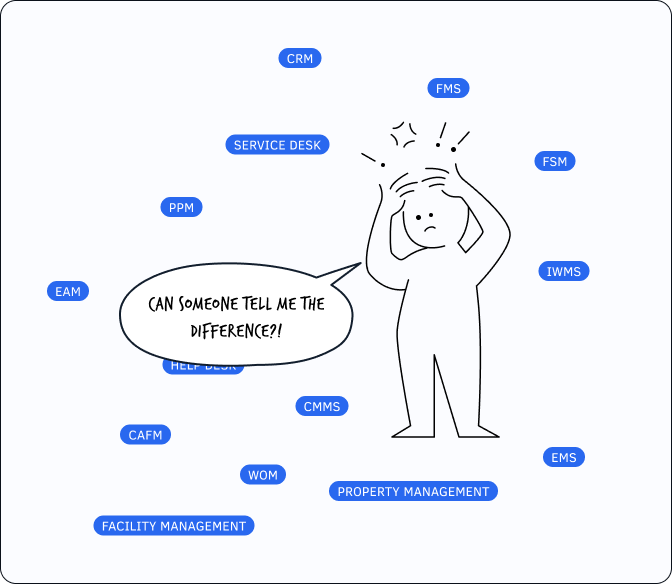 Understanding IT solutions for Facility and Property Management can be tough
Understanding IT solutions for Facility and Property Management can be tough
Although it's a long read, we've made sure to save you time.
All subheadings are independent paragraphs. If you know exactly what you want to know more about, feel free to follow the link and read through the material.
- Here you will learn to distinguish between Facility and Property Management
- In this section we have listed the general functionality of FM solutions and gave the most known software examples
- And in this section you will find the information on PM solutions
You might also find it helpful to read a short checklist article — if you already know which solution is right for you. There we also offer five tips on how to choose a system that won't disappoint you.
 Checklist for choosing the right business system
Checklist for choosing the right business system
Facility and Property management: what’s what?
Facility Management involves ensuring the efficient operation of buildings and infrastructure, encompassing tasks such as equipment maintenance, system upkeep, space management, and security.
Property Management entails overseeing real estate assets on behalf of the owner. This includes finding good tenants, collecting rent, fixing things that break, and making sure everything is legal and up-to-date.
Practically, these two fields are different, as they involve different responsibilities and focus on different aspects of managing property.Facility Management (FM) focuses on managing the physical facilities within the property, including maintenance, repairs, upgrades, and safety and security.
Property Management (PM) focuses on managing the overall property, including leasing, tenant relations, rent collection, property maintenance, and financial management.
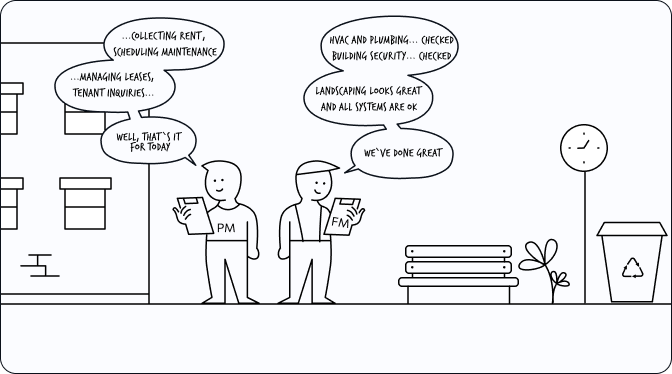 The roles of PM and FM are intertwined, but they still differ in some respects
The roles of PM and FM are intertwined, but they still differ in some respects
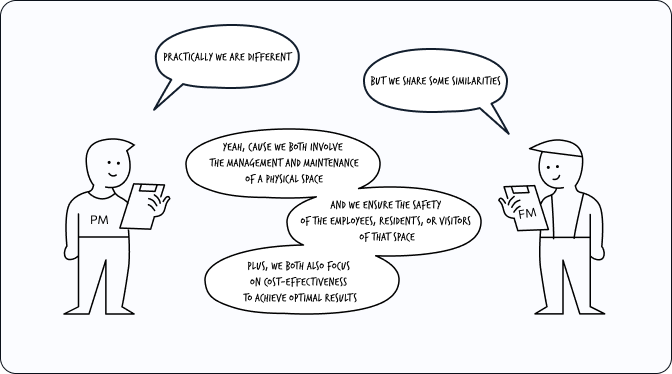 Both FMs and PMs share the same goal
Both FMs and PMs share the same goal
Both Facility and Property Management set the standards for Real Estate Maintenance. To achieve these standards, various solutions are available on the market to help streamline maintenance, optimise workflows, and ensure accountability.
If you need to know more about the solutions for leasing, tenant relations, rent collection, property maintenance, and financial management, go to the Property Management solution section. And if you need to explore solutions for maintenance, repairs, upgrades, and safety and security, go to the Facility Management solution section.
Facility Management software
This section provides an overview of FM systems in the IT solutions industry. After reading this you will learn:
- What processes these systems automate
- How they can help in your business processes
- And how to set them up and what key features they offer
General Functions and Features of Facility Management solutions
Software used for Facility Management typically has the following functionality:
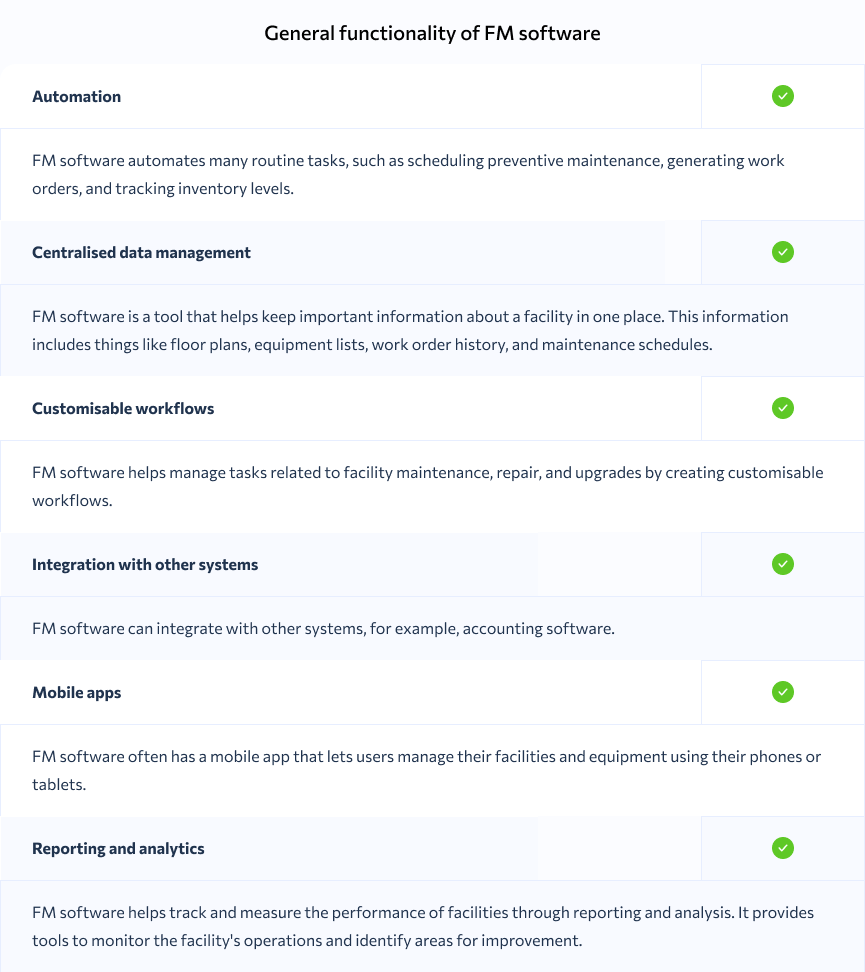 Software for Facility Management: general functionality
Software for Facility Management: general functionality
Simple example of how Facility Management solutions work
We've covered the basic theory, now let's see how TagPoint as CMMS demonstrates all these features in practice.
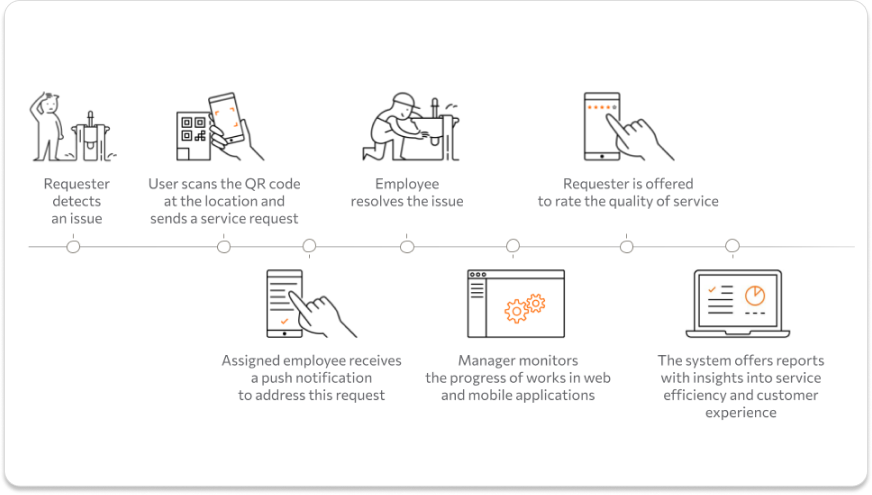 The workflow of FM solutions
The workflow of FM solutions
This is how it works in TagPoint.
In other systems, the workflow might be similar, since FM solutions are designed in this way. But QR-codes are our unique method for creating requests, tasks and work orders. It simplifies and speeds up the entire process.
Facility Management solutions that are well known and widely used
EAM
EAM stands for Enterprise Asset Management.
The goal of EAM software is to help companies manage their assets throughout their entire lifecycle - from acquisition to disposal. The tool is perfect for enterprise-level companies looking to keep track of assets and keep them organised.
CMMS
The Computerised Maintenance Management System is a great tool to streamline maintenance tasks, work orders, and asset records.
If you're a company that needs to automate your service and maintenance tasks, improve customer loyalty, or monitor the performance of your team, then CMMS is the way to go.
Easy-to-use app for facility managers
Future-ready way to digitalise your service requests, coordinate your teams and continuously improve.CAFM
Organisations can identify improvement areas and optimise space usage with Computer-Assisted Facility Management Software.
It is a very useful tool for organisations that have assets or facilities to monitor, such as educational institutions, hospitals, and government departments.
Property Management Software
In contrast to CMMS, CAFM, and EAM for Facility Management, Property Management software doesn't have a standardised naming convention.
Usually, the PM systems have a specific brand name, such as Yardi, AppFolio or Buildium.
These are software solutions designed specifically for Property Management tasks and can include a range of features such as lease management, rent collection, tenant communication, and maintenance management.
General Functions and Features of Property Management solutions
Property Management software is designed to help property managers and landlords manage their real estate properties. Some common functionality of Property Management software include:
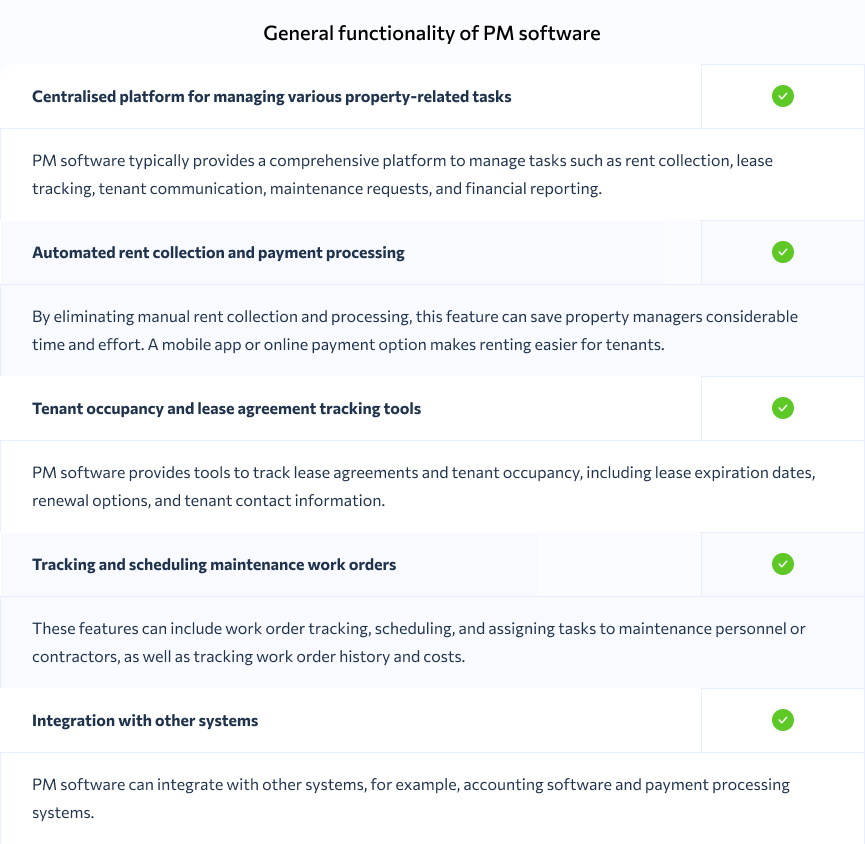 Software for Property Management: general functionality
Software for Property Management: general functionality
Still confused? Here's our expert advice
Choosing the right automation system for your business doesn't require you to be an expert in IT.
You just need to write down your business goals, make a list of what you want to automate, and estimate your budget.
And then contact the vendor of the system that interests you.


